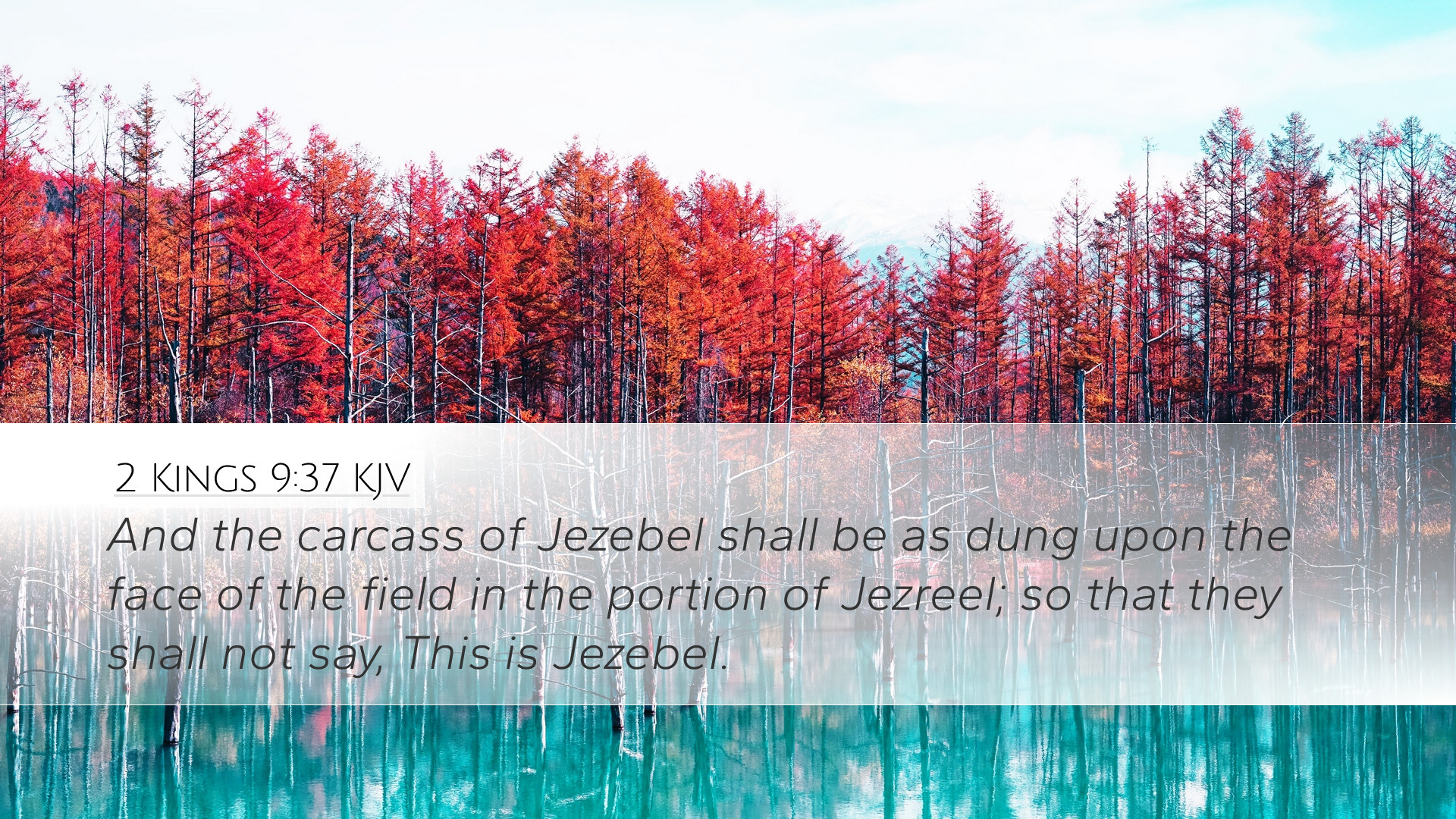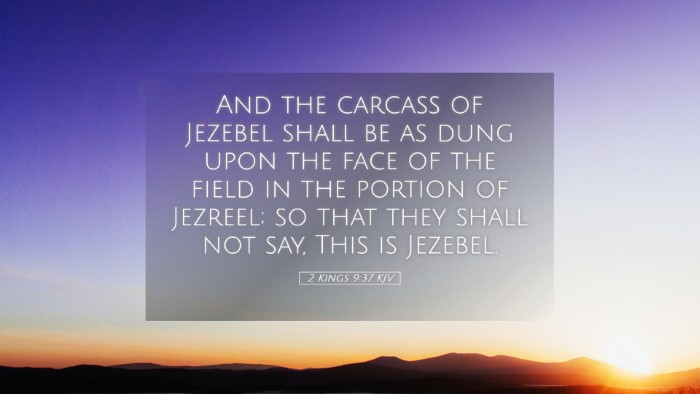Commentary on 2 Kings 9:37
Bible Verse: “And the dogs shall eat Jezebel in the portion of Jezreel, and there shall be none to bury her.”
Introduction
The verse in question, 2 Kings 9:37, serves as a prophetic declaration regarding the fate of Jezebel, the notorious wife of King Ahab of Israel. This verse encapsulates the divine judgment against one of the most emblematic figures of unrighteousness in the Old Testament, a theme that resonates throughout the Biblical narrative. The insights extracted from public domain commentaries by Matthew Henry, Albert Barnes, and Adam Clarke collectively illuminate the theological and historical significance of this pronouncement.
Historical Context
The narrative surrounding this verse comes during a tumultuous period in Israel's history, marked by idolatry, moral decay, and conflict. Jezebel's promotion of Baal worship and her persecution of the prophets of Yahweh (1 Kings 18; 19) set the stage for her eventual downfall. The prophecy of her demise is crucial to understanding God's judgment on both her and the house of Ahab, as discussed extensively in historical theology.
Matthew Henry's Insights
According to Matthew Henry, Jezebel represents the apex of idolatrous influence in Israel. He emphasizes the following key points:
- Divine Judgment: Henry notes that the prophecy against Jezebel signifies God’s ultimate judgment on sin. He stresses God's sovereignty in delivering retribution to those who perpetuate evil, especially leaders who lead others into sin.
- Disgrace in Death: The manner of her death—being eaten by dogs—highlights the severity of her sins. Henry indicates that this brutal fate served as a stark contrast to the norms of burial rites, thereby emphasizing her disgrace.
- Symbolism of Dogs: He interprets the dogs as symbols of impurity and neglect, reflecting the utter rejection of Jezebel not only in life but in death, underscoring God’s disdain for her actions.
Albert Barnes' Commentary
Albert Barnes expands on the implications of Jezebel's demise. He addresses several aspects:
- Fulfillment of Prophecy: Barnes asserts that the prophecy signifies God's unerring ability to fulfill His Word. The specific mention of dogs consuming her body serves as a literal fulfillment of Elijah's prophetic words, thus enhancing the credibility of prophetic declaration.
- Lack of Mourning: He observes that the prophecy indicates there would be “none to bury her," which intensifies the horror of her fate. In ancient Israel, burial was an act of dignity, and her absence of burial reflects the total rejection and disdain that God has for her legacy.
- Contrast with Righteousness: Barnes notes that the fate of Jezebel stands in stark contrast to the fate that awaits the righteous, emphasizing that while the wicked may prosper temporarily, God's justice ultimately prevails.
Adam Clarke's Exploration
Adam Clarke provides a more detailed exploration of the text focusing on its literary and spiritual implications:
- Symbol of Idolatry: Clarke identifies Jezebel as a quintessential symbol of idolatry and moral corruption. He discusses how her actions led the nation of Israel astray, making her a target for divine wrath.
- Terrifying Imagery: He highlights the terrifying imagery of her fate and how it serves as a warning to the people of Israel regarding the consequences of persistent rebellion against God.
- Theological Implication: Clarke concludes by asserting that this judgment serves as a broader theological lesson about the nature of God’s justice. It illustrates that there are parameters of divine patience, after which judgment becomes inevitable.
Conclusions
The prophetic declaration of 2 Kings 9:37 regarding Jezebel is a powerful testament to the overarching theme of divine justice within the biblical narrative. Through the lens of the commentaries by Henry, Barnes, and Clarke, one can derive significant insights into the nature of judgment, the consequences of sin, and the importance of aligning oneself with God's righteousness. For pastors, students, theologians, and Bible scholars, this verse offers both a sobering reminder of God’s judgment upon wickedness and the timeless relevance of its lessons in contemporary contexts.
Reflection for Today
As we reflect on this verse and the accompanying commentary, it serves as a significant call to examine our own lives and the influences we uphold in our communities. Are we promoting righteousness, or are we, like Jezebel, advancing ideologies that corrupt moral standards? The fate of Jezebel evokes solemn introspection and challenges us to stand firm in our commitment to God against the darkness that seeks to overshadow His truth.


